Just a person learning Japanese. Self-learner. If you're also studying Japanese and want to practice with someone (and you're also very much a beginner) then message me! はじめまして! さびーなです。よとしく!
196 posts
Latest Posts by earthquakedeer - Page 3

pronunciation | tsUn-dO-kU (tsoon-doh-koo) submitted by | chrysalismm submit words | here Japanese script | 積ん読 kanji, つんどく hiragana
血も涙もない
血も涙もない (ちもなみだもない) - heartless, unfeeling, cold-blooded. Literally “having no blood and no tears”.
Ready for a writing session today?
If you’re seeing this, consider either:
Writing for 15 minutes or
Brainstorming for 15 minutes!
With November coming up, I know quite a few of us intend participating in NaNoWriMo and/or tackling a writing project. This weeks writing session is dedicated to whatever you want to do to prep!
PSA! I plan on holding a write in during the upcoming week, so keep a lookout for that announcement here on this blog, eggletine.tumblr.com or on my twitter (you can find me @Eggletine)

cute onomatope words

ビュービュー whistling sound; sound of the wind
わくわく tremble; excited
ぽかぽか nice and warm
ふんわり gently; airily; fluffy
ピンピン lively
にこにこ friendly smile
そっと softly; gently; quietly
すらすら smoothly
すやすや sleeping peacefully
ザーザー heavy rainfall
さらさら murmuring
ころころ lightly rolling
きらきら sparkle
ふわふわ fluffy
ぴかぴか glitter; twinkle
Reblog if English isn't your native language
i need someone to read me a language textbook like a bedtime story every night
鬼の目にも涙
おにのめにもなみだ
Even the hardhearted can be moved to tears
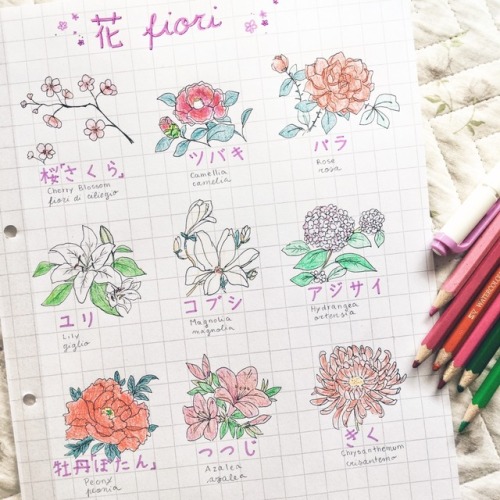
「25-06-2017」flowers
To everyone learning a language, who is getting frustrated and impatient and maybe even thinking of quitting: remember how far you have come (not how far you have to go), remember why you started and remember how fantastic the end product will be. Learning a language is difficult and the journey can be long but it is rewarding and it opens so many doors. You are capable of doing this, you can do this… don’t quit now
CAN I JUST SAY シ AND ツ ARE AMAZING BECAUSE THEY LOOK LIKE SMALL PEOPLE? DON'T FORGET ン OR ソ, THEIR PIRATE NEIGHBORS
I 10000% agree.
Japanese Vocabularies: Talking about human body

Let’s talk about human body in Japanese!
First, we’ll talk about head (頭 atama). Japanese word for head doesn’t include the face. That is why this word is used often in figurative speech such as 頭が良い (atama ga yoi) which means “smart” or literally “head is good” and 頭が良い (atama ga warui) which means “stupid” or literally “head is bad”. Face in Japanese is 顔 (kao). Notice that the right part is similar to 頭 (atama). Let’s start with the basic of face. Eye is 目 (me), mouth is 口 (kuchi), tongue is 舌 (shita), tooth is 歯 (ha), ear is 耳 (mimi) and the nose is 鼻 (hana). Note that flower is also 花 (hana). They both have different kanji. Another part of 顔 (kao) are まゆ毛 (mayuge: eyebrow), まつ毛 (matsuge: eyelash), くちびる (kuchibiru: lips) ほお (hoo: cheek), あご (ago: chin) and ひたい (hitai: forehead).
Our hand is 手 (te) and finger is (指 yubi). Talking about 指 (yubi), 親指 (oya yubi) is the thumb and literally translated as parent finger. 人差し指 (hitosashi yubi) is index finger and the literal meaning is a finger to point at people. 中指 (naka yubi) literally means center finger. Ring finger is 薬指 (kusuri yubi) which translated as drug finger. In the old days, people use that finger to take their powder drugs since they though it was the cleanest of all. And 小指 (koyubi) literally means small finger. お腹 (onaka) means stomach. When someone is hungry, they said お腹が空いた (onaka ga suita) which literally means that “one’s stomach is empty”. When someone is full, they said お腹がいっぱい (onaka ga ippai) which literally means that “one’s stomach is full”. 足 (ashi) is foot and the toe is 足の指 (ashi no yubi). Note that in Japanese, 足 (ashi) cover for both leg and foot. So if someone said 足が痛い (ashi ga itai), they might mean that their foot or leg is hurt or it also could be both of them. When required, they do have a more distinct word for heel, knee, and other parts though. And that’s all for today! Whew, what a lot of words. And this is not even the complete list! It’s okay if you take it easy and memorize just one part at a time.
Happy learning °˖✧◝(⁰▿⁰)◜✧˖°
…………………………………………
Useful Links:• CrunchyNihongo - Easy to Learn Japanese Lessons Site • Get our easy Japan lessons on your facebook timeline • FREE DOWNLOAD! Resourceful app to start learning Japanese! • Books to guide & help you learn Japanese
気 Expressions
気 (き/ki) is a word that means “spirit” or “mood,” but it is used in many different expressions. Here are some of the expressions:
気に入り (ki ni iri) = favorite
気に入る (ki ni iru) = to be pleased with
気にする (ki ni suru) = to mind, worry, care about
気にするな!(ki ni suru na) = Don’t worry about it!
気に掛ける (ki ni kakeru) = to way on one’s mind, to trouble one’s heart
気になる (ki ni naru) = to worry, be anxious, uneasy
気に障る (ki ni sawaru) = to offend
気に座る (ki ni suwaru) = to hurt one’s feelings
気に留める (ki ni tomeru) = to heep in mind, give heed to, pay attention to
気を付ける (ki wo tsukeru) = to be careful, take care
気をつかう (ki wo tsukau) = to pay attention to another’s needs
気を悪くする (ki wo waruku suru) = to take offense at, feel hurt
気を許す (ki wo yurusu) = to let one’s guard down
気を散らす (ki wo chirasu) = to distract a person’s attention
気を取られる (ki wo torareru) = to have one’s attention caught, to be preoccupied with
気を静める (ki wo shizumeru) = to calm feelings, compose oneself
気を配る (ki wo kubaru) = to pay attentnion, be watchful
As you can see, these expressions that use 気 often have to do with one’s feelings or mood (and many of them are very similar). So, I’ll say to everyone today:
みんな、気を付けてください!
Everyone, take care!
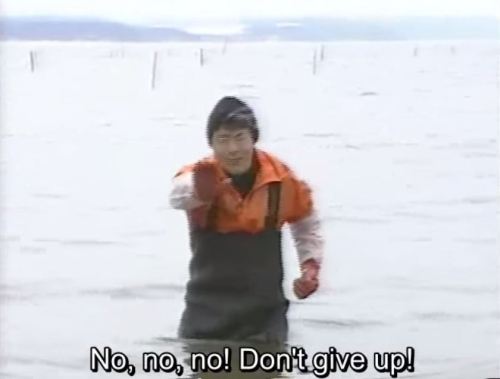

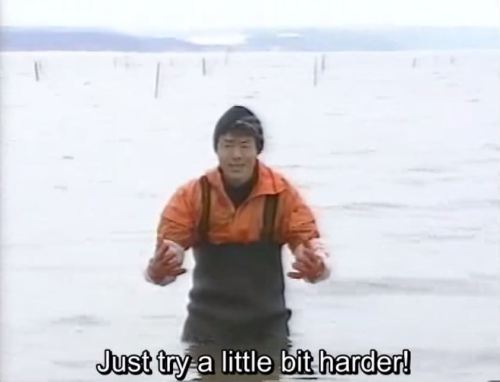


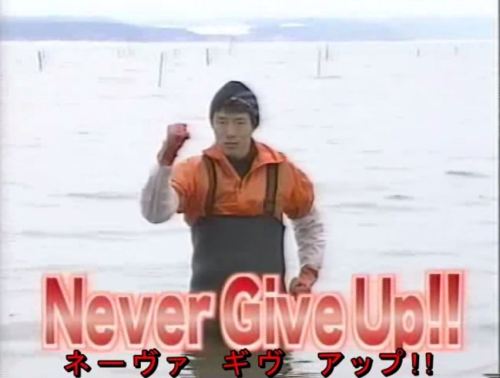

Japanese slang!
PS: Start learning #Japanese language the best way, just click here!

JLPT | 日本語能力試験 Hey guys, throughout my time running this studyblr I’ve received a lot of questions regarding the JLPT exam. Personally, I myself have never taken the exam nor am I planning on doing so in the near future, however I have asked my closest friends around me who have taken the exam in the past, or who are currently studying for it, for advice regarding how to prepare for the exams. So below is some advice, information, and resources that I’ve gathered over time. I hope it’ll be able to help answer some of your questions! What is the JLPT and why is it important? The Japanese Language Proficiency Test is an internationally recognised exam that measures the proficiency of non-native Japanese speakers. There are five levels, N5, N4, N3, N2, and N1. N5 is the lowest level, which is equivalent to basic conversational Japanese skills, and N1 is the highest level, equivalent to that of a native speaker. The JLPT is important say for example, if you plan on working in Japan in a job that requires you to use Japanese. How can I take the JLPT? The test is held twice a year (July and December) in some cities, and just once a year in other cities (December). On the official website is a list of institutions that hold the JLPT. Which level should I take? You can attempt sample questions from the different levels on the official website in order to understand which level you are. What will I be tested on? The JLPT tests examiners on their vocabulary, grammar, reading, and listening skills. For a full view of all the items you will be tested on, check out the official website for more information. How should I study for the JLPT? There are a lot of websites online with information, resources, and study-guides for each level of the JLPT. This website hosts pdfs with practice tests, official workbooks, mock tests, and answer sheets for each level of the JLPT. It’s a good idea to purchase a textbook so that you can learn new vocabulary, grammar, and kanji, as well as get in some reading practice or practice exercises. - For N5/N4 I can recommend the Genki series or Minna no Nihongo. - For N3 Jitsuryoku Up! Nihongo Nouryoku Shiken has been recommended. - For N2/N1 日本語総まとめ and Kanzen Master (新完全マスター) books have been recommended. I’ve been told kanji is used quite sparingly in the N5/N4 exams, so I’ve been advised that you shouldn’t spend all of your time studying kanji for those exams. A good idea is to focus on the recommended kanji for each level, and spend more time on vocabulary, grammar, and more time on reading and listening comprehension. You should try to study every day if possible. Studying/cramming for a certain amount of hours in just one session each week is not a good way to retain information. You don’t have to study in the traditional sense every single day, it can be anything from reviewing vocabulary, going through kanji flashcards, or talking with Japanese friends. Another good tip is to time yourself with the appropriate exam timings when taking a practice test online to see how you score under exam conditions. Recommended websites and apps: - Memrise - for vocabulary - Anki decks - for kanji - iTalki - speak with conversation partners or Japanese teachers - Nihongo Ichiban - JLPT materials - JapaneseTest4You - JLPT materials - Jisho - good online dictionary - Nihongonomori - JLPT Youtube channel - Tanos - JLPT materials Textbook PDF’s: - Genki I - Genki II - Genki Answer Key - Japanese for Busy People - Kanji Look and Learn - A Dictionary of Basic Japanese Grammar - Tae Kim’s Japanese Grammar Guide Disclaimer: As I mentioned before I’ve never taken the JLPT exam, nor do I plan on taking it anytime soon, so I cannot be certain that all the informatin I’ve listed is correct. If I’m wrong about anything please let me know! 頑張ってください!

★ leg(s) in Japanese is 脚 (あし – ashi). ★ foot/feet in Japanese is also pronounced あし (ashi) but the kanji is different: 足 \(◕ω◕)/☆ ……………………………………………………………………………….. Learn more Body Parts: http://www.punipunijapan.com/body-parts-japanese/ Face kao 顔(かお) Cheek(s) hoppeta ほっぺた Forehead odeko おでこ Teeth ha 歯(は) Tongue shita 舌(した) Lips kuchibiru 唇(くちびる) Hair (on head) kami 髪(かみ) Neck kubi 首(くび) Throat nodo 喉(のど) shoulder(s) kata 肩(かた) elbow(s) hiji 肘(ひじ) wrist(s) tekubi 手首(てくび) back senaka 背中(せなか) hips/lower back koshi 腰(こし) knee(s) hiza 膝(ひざ) ankle(s) ashikubi 足首(あしくび) finger(s) yubi 指(ゆび) toe(s) tsumasaki 爪先(つまさき) ………………………………………………………………………………. Click here to learn more! http://www.punipunijapan.com/body-parts-japanese/

you owe it to yourself to keep moving forward.


今日の昼食は、中華料理店で食べて、すごい美味しかったよ! Today, we ate lunch at a Chinese restaurant and it was delicious!
あと漢字の読み練習した。 After, I practiced reading kanji.
最近、日がどんどん短くなってきて、なんだかちょっと悲しいよね。 Lately, the days are getting shorter and shorter, somehow it’s a little sad.
あなたの住んでいる所は、今何時に日が暮れるか? Where you live, at what time does the sun sets?

Common Japanese Verbs Hey guys, below is a list of what I believe to be common Japanese verbs! I’ll also be posting a list of common adjectives, adverbs, and nouns in the future too, so keep an eye out for them! There are a number of ways that verbs have been categorised in Japanese, such as Ichidan 「一段」 and Godan 「五弾」, andうverbs and るverbs. I’ve listed them all in the titles for easier understanding, depending on what distinction you’re familiar with. These classifications come in handy when you need to conjugate verbs so try to remember what category they belong to! うverbs・五弾「ごだん」・Class 1: To begin (something starts on its own)・始まる・はじまる To buy・買う・かう To close・閉まる・しまる To die・死ぬ・しぬ To drink・飲む・のむ To eat・食べる・たべる To end・終わる・おわる To enter・入る・はいる To give back (return something to someone)・返す・かえす To go・行く・いく To go back・戻る・もどる To have/exist (inanimate objects)・ある To know・知る・しる To learn・習う・ならう To listen・聞く・きく To make・作る・つくる To meet・会う・あう To play・遊ぶ・あそぶ To receive・貰う・もらう To repair・直す・なおす To return・帰る・かえる To ride on・乗る・のる To run・走る・はしる To send・送る・おくる To sit・座る・すわる To speak・話す・はなす To swim・泳ぐ・およぐ To take・取る・とる To take off (shoes, clothes)・脱ぐ・ぬぐ To understand・分かる・わかる To use・使う・つかう To wait・待つ・まつ To wake up・起こす・おこす To wash・洗う・あらう To write・書く・かく るverbs・一段「いちだん」・Class 2: To answer・答える・こたえる To bathe・浴びる・あびる To be able・出来る・できる To be born・生まれる・うまれる To be enough・足りる・たりる To begin (to start something)・始める・はじめる To borrow・借りる・かりる To break・壊れる・こわれる To check・調べる・しらべる To cut・切れる・きれる To exceed・過ぎる・すぎる To find・見つける・みつける To forget・忘れる・わすれる To get off・降りる・おりる To get tired・疲れる・つかれる To give・あげる To go out・出る・でる To greet・迎える・むかえる To have/exist (animate objects)・いる To help・助ける・たすける To make a mistake・間違える・まちがえる To open・開ける・あける To remember・覚える・おぼえる To see・見える・みえる To show・見せる・みせる To sleep・寝る・ねる To stop・止める・やめる To teach・教える・おしえる To think・考える・かんがえる To wear・着る・きる Irregular verbs・Class 3: To come・来る・くる To do・する
する verbs: する verbs are made by adding する to a noun. To ask questions・質問する・しつもんする To be surprised・びっくりする To call・電話する・でんわする To do the cleaning・掃除する・そうじする To do the washing・選択する・せんたくする To get married・結婚する・けっこんする To go shopping・買い物する・かいものする To have a meal・食事する・しょくじする To reserve・予約する・よやくする To study・勉強する・べんきょうする To take a walk・散歩する・さんぽする To travel・旅行する・りょこうする

The obsolete English -k suffix is my new favourite thing (source). It’s also the same -k that derives “hark, hearken” from “hear”.



I went shopping at TOKYU HANDS yesterday 🚃 昨日、東急ハンズへお買い物に行きました。
I’ve always wanted these clips ❤️ ずっとこのクリップが欲しかったの。
After that, I went out drinking with a friend 🍻 そのあと、友達と飲みに行きました。
Today, a typhoon is approaching to my town 💦 今日は、私の住んでいる町に台風が接近中です。
It’s pouring rain and very windy 😵 どしゃ降りの雨と強い風です。
I can’t go out anywhere, so I’m going to study English all day ✏️📖 外に出られないので、1日中お勉強します。
OK, I’ll memorize English words!! よし、単語を覚えるぞ。
———- Note to self ———- go shopping ○ go to shopping × after that : それから/そのあと go out : 出掛(でか)ける go out 〜ing : 出掛(でか)けて〜をする ———————————

Comparing Two Things in Japanese
A is more X. than B. (X = adjective) AはBよりXです。
The dog is cuter than the cat. 犬は猫よりかわいいです。 (いぬ は ねこ より かわいい です)
This bag is lighter than that bag. この鞄はその鞄より軽いです。 (この かばん は その かばん より かるい です)
Between A and B which one is more X? AとBとどちらがXですか。
Between China and Japan, which is bigger? 中国と日本とどちらが大きいですか。 (ちゅうこく と にほん と どちら が おおきい です か)
China is bigger than Japan. 中国は日本より大きいです。
A is more X. Aの方がXです。(のほうが)
China is bigger. 中国の方が大きいです。 (ちゅうこく の ほう が おおきい です)
Both are (equally) X. どうちらもXです。
Between cats and dogs, which are cuter? 猫と犬とどうちらがかわいいですか。 (ねこ と いぬ と どうちら が かわいい です か)
Both are cute. どうちらもかわいいです。

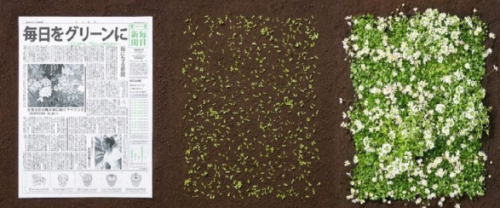
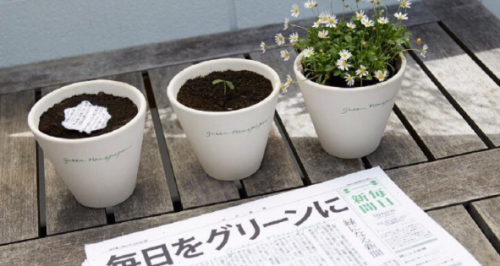
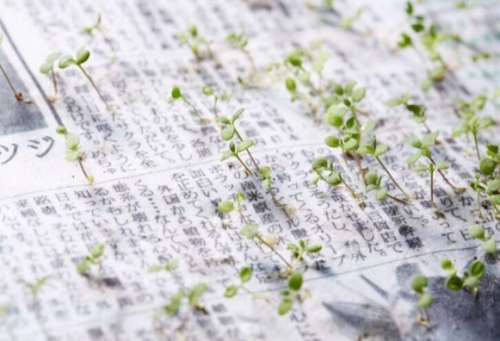
when you really do care about mother nature
Kanji version of words usually written in hiragana
While these words are usually written in hiragana, sometimes you’ll see them written in kanji instead, so learning to at least recognize them is pretty helpful. Trust me on this, I got confused by 沢山 way too many times already haha
有難う(ありがとう)ー thank you 幾つ(いくつ)ー how many 流石(さすが)ー as one would expect 更に(さらに)ー furthermore, again, after all 既に(すでに)ー already 沢山(たくさん)ー a lot 丁度(ちょうど)ー just, exactly, precisely 出来る(できる)ー to be able 尚(なお)ー furthermore, still, yet 何故(なぜ)ー why 等(など)ー et cetera 程(ほど)ー degree, extent, approximately 然し(しかし)ー however 居る(いる)ー to be (people, animals) 有る(ある)ー to be (things) 恐らく(おそらく)ー probably, likely 下さい(ください)ー please (give me, do for me) 只(ただ)ー only, just; free of charge 及び(および)ー and, as well as
熟字訓 Jukujikun

I’ve made a post on this before, but these are words that have pronunciations that don’t line up with the readings of the kanji they use.
明日「あす」 Tomorrow (formal)
大人「おとな」 Adult
母さん「かあさん」 Mother
父さん「とうさん」Father
兄さん「にいさん」Older brother
姉さん「ねえさん」 Older sister
河原「かわら」River bed
昨日「きのう」 Yesterday
今日「きょう」Today
果物「くだもの」 Fruit
今朝「けさ」 This morning
景色「けしき」Scenery
今年「ことし」 This year
清水「しみず」Spring water (also used as a surname)
上手「じょうず」skillful
下手「へた」unskilled
七夕「たなばた」 Star Festival
一日「ついたち」 First day of the month
時計「とけい」Watch
博士「はかせ」Doctor (PHD)
二十日「はつか」Twentieth day
二十歳 「はたち」Twenty years old
一人「ひとり」 One person
二人「ふたり」 Two people
二日「ふつか」 Second day, two days
部屋「へや」Room
迷子「まいご」Lost child
真面目「まじめ」Diligent
真っ赤「まっか」Bright red
真っ青「まっさお」Deep blue
眼鏡「めがね」Glasses
八百屋「やおや」Greengrocer
可愛い 「かわいい」Cute
お土産 「おみやげ」Souvenir
小豆 「あずき」Adzuki beans
白髪 「しらが」White/grey hair
田舎 「いなか」Rural
五月雨 「さみだれ」 Early summer rain
足袋 「たび」Japanese-style socks
煙草 「たばこ」Tobacco (from dutch)
馴鹿 「となかい」Reindeer (from Ainu)

Today we’ll be learning how to express “while/during” in Japanese with ながら (nagara)
Happy learning °˖✧◝(⁰▿⁰)◜✧˖°
…………………………………………
Useful Links:
• CrunchyNihongo - Easy to Learn Japanese Lessons Site • Get our easy Japan lessons on your facebook timeline • FREE DOWNLOAD! Resourceful app to start learning Japanese! • Books to guide & help you learn Japanese
Kanji vocab #1
彼: かれ、かの he
彼(かれ) he, boyfriend
彼女(かのじょ)she, girlfriend
彼ら(かれら)they
代:ダイ、か age; replace
時代(じだい)age, era
電気代(でんきだい)electricity fee
九十年代(きゅうじゅうねんだい)the 90’s
十代(じゅうだい) in one’s teens
〜代わりに(かわりに)instead of ~
留: リュウ、ル to stay; to keep
留守(るす)absence, not at home
留学生(りゅうがくせい)foreign student
留学する(りゅうがくする)to study abroad
族: ゾク family; tribe
家族(かぞく)family
民族(みんぞく)race
水族館(すいぞくかん)aquarium
王族(おうぞく)member of royalty
親:シン、おや、した parent; intimacy
父親(ちちおや)father
母親(ははおや)mother
親友(しんゆう)best friend
両親(りょうしん)parents
親しい(したしい)intimate
親切(しんせつ)kind
切: セツ、き、きっ to cut
切る(きる)to cut
切手(きって)postage stamp
切符(きっぷ)ticket
大切(たいせつ) precious
親切(しんせつ)kind
英: エイ English; excellent
英雄(えいゆう)hero
英語(えいご)English
店: テン、みせ shop/store
店員(てんいん)store clerk
売店(ばいてん)stall
書店(しょてん)bookstore
去: キョ、コ、さ past; to leave
去年(きょねん)last year
過去(かこ)the past
去る(さる)to leave
消去する(しょうきょする)to erase
急: キュウ、いそ to hurry; emergency
急に(きゅうに)suddenly
急行(きゅうこう)express train
急ぐ(いそぐ)to hurry
特急(とっきゅう)super express
乗: ジョウ、の to ride
乗る(のる)to ride
乗車(じょうしゃ)riding a car
乗馬(じょうば)horseback riding
乗り物(のりもの)vehicle
当:トウ、あ to hit
本当(ほんとう)really
お弁当(おべんとう)bento box
当時(とうじ)at that time
当たる(あたる)to hit
音:オン、と、ね sound
音楽(おんがく)music
音(おと)sound
本音(ほんね)real intention/thoughts
発音(はつおん)pronunciation
楽:ラク、ガク、ガッ、たの pleasure
楽しい(たのしい)fun
楽しむ(たのしむ)to enjoy
楽器(がっき)musical instrument
楽(らく)easy, comfortable
音楽(おんがく)music
医:イ doctor; medicine
医者(いしゃ)doctor
歯医者(はいしゃ)dentist
医学(いがく)medical science
医院(いいん)clinic
者: シャ、もの person
学者(がくしゃ)scholar
医者(いしゃ)doctor
若者(わかもの)young people
読者(どくしゃ)reader
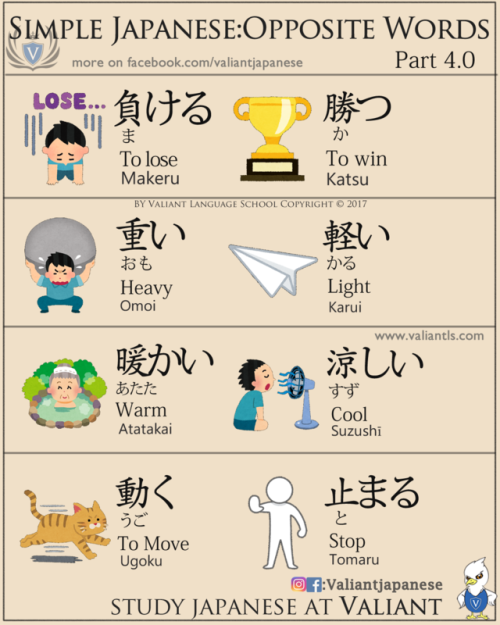
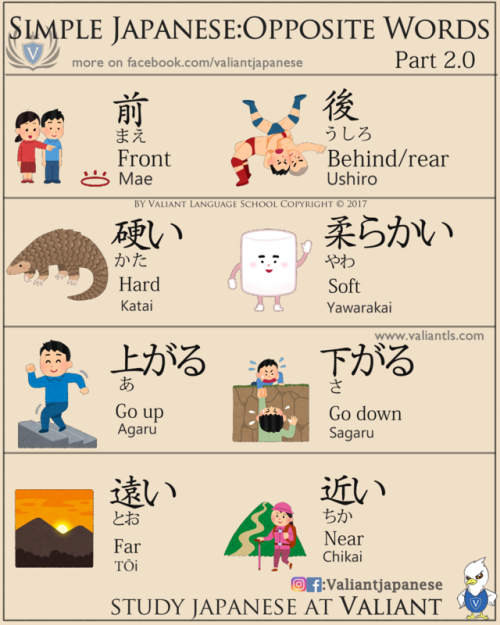
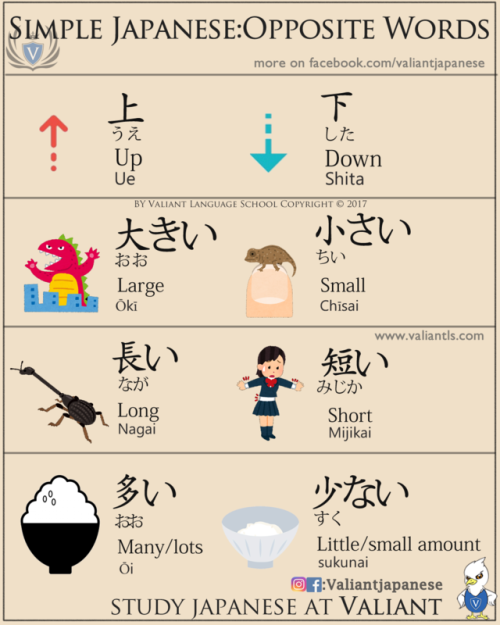
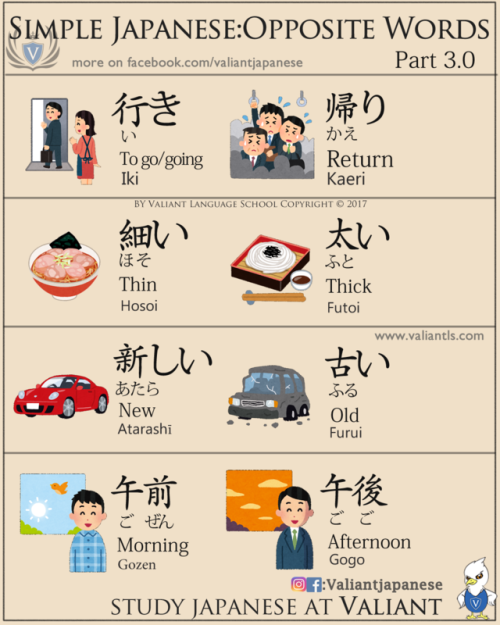
The Opposite Words in Japanese
Follow us on www.instagram.com/valiantjapanese